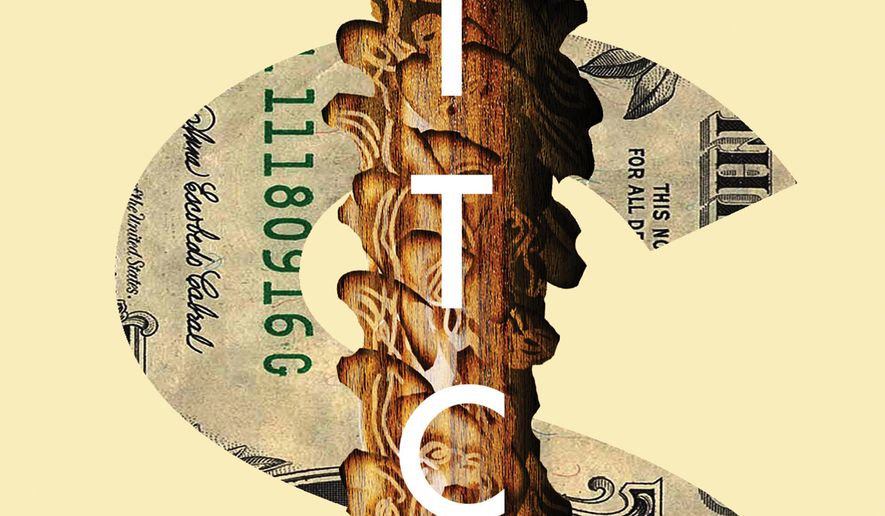OPINION:
Any organization that gets it wrong a third of the time needs reform. Such is the case with the International Trade Commission.
The Trump administration has prioritized correcting trade imbalances for myriad reasons, including domestic economic policy and national security. Part of this course correction should include reforms at the ITC.
The ITC investigates cases in which imported goods may be harming domestic industries. When working as intended, the ITC protects American companies from unfair trade practices perpetrated by foreign competitors, including patent infringement. Following what are known as Section 337 investigations, the ITC has the authority to issue exclusion orders, enforced by U.S. Customs and Border Protection, which bar the goods in question from entering the country and keep domestic markets free of foreign products built with stolen U.S. intellectual property.
Exclusion orders are a double-edged sword, now often used to harm rather than defend American industry.
Blocking products from entering U.S. markets is a significant matter with far-reaching consequences, which makes Section 337 investigations an enticing tool for bad actors to abuse. Companies accused of infringement at the ITC are often encouraged to settle rather than risk a debilitating adverse ruling.
Investigations concerning even a small part of a larger product can have an outsized impact. As noted last year by a representative from the Alliance for Automotive Innovation during congressional testimony on Section 337 investigations in the auto industry, complaints “frequently relate to small dollar parts within a vehicle. Since the primary enforcement remedy available to the [ITC] is an exclusion order that applies to the entire vehicle, automotive companies are frequently forced into settling — even when the merits of the complaint are weak.” The rationale for this is simple: A potential violation of one patent on one small part could result in an import ban on the entire vehicle.
Given that more than 95% of ITC complaints trigger an investigation, this power imbalance between complainants and defendants has made the agency a magnet for foreign companies and even shell companies harnessing exclusion order threats for financial gain.
In 2022 and 2023, 31% of Section 337 investigations were initiated by foreign companies and their domestic subsidiaries attempting to stop U.S. companies from importing their own products back into the country. In other words, nearly a third of the time, the ITC’s mission was flipped entirely on its head.
Making matters worse, shell companies that don’t make products of their own have turned to the ITC. These bad actors purchase patents and initiate patent infringement lawsuits instead of manufacturing and selling goods. They often wage legal battles in federal courts, but the opportunity to exploit ITC investigations for settlements has proved too tempting to pass up.
Over the same 2022 to 2023 period, about a third of all ITC investigations were brought by “nonpracticing entities,” which leverage the agency’s investigatory power despite not having products to guard against infringement.
The worst transgressions occur when the two complainant categories overlap and foreign-based shell companies use ITC investigations to target American manufacturers. One notable case is instructive: An investment fund-owned foreign shell company, Neodron, launched an ITC investigation to block 90% of all smartphones and tablets from the U.S. market. The case ended with a multimillion-dollar settlement.
Another active investigation involves a South Korean nonpracticing entity, International Semiconductor Group, pursuing exclusion orders related to products developed by American manufacturers Dell and HP, where the allegedly infringing parts are made by another American manufacturer, Intel. The irony here is particularly rich. The Trump administration recently acquired a 10% stake in Intel, with the president noting that Intel’s work “is fundamental to the future of our nation.”
It is difficult to see how investigations like these — which increase costs for American companies and consumers, slow innovation and affect critical industries — are consistent with the ITC’s purpose.
No one is arguing that ITC investigators are intentionally harming American companies. However, the ITC and lawmakers are on notice that counterproductive ITC abuses continue. Being on active notice means there is responsibility.
Congress has proposed reforms to limit the most glaring ITC misuses. The Advancing America’s Interests Act, for example, would strengthen ITC standards, ensuring that complainants have a domestic industry to protect and are not merely shell companies pursuing settlements. The measure would also reaffirm the ITC’s obligation to proactively determine whether any exclusion order serves the American public interest.
This proposal to reorient the ITC to its intended mission deserves renewed attention alongside trade negotiations to prevent the U.S. from being on the wrong side of bad deals. The Trump administration and Congress should ensure that the ITC is there to help American companies, not allow malevolent actors to hold American companies hostage.
• Trey Gowdy represented South Carolina’s 4th Congressional District in the U.S. House of Representatives from 2011 to 2019. Before serving in Congress, he was a federal prosecutor and solicitor in South Carolina.




Please read our comment policy before commenting.